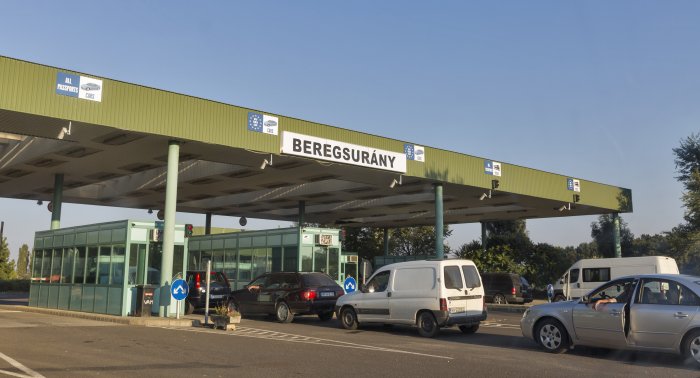Business Meets Government: A Direct Communication Link

The fifth AmCham Business Meets Government Summit was held at the Budapest Marriott Hotel on October 16. The Budapest Business Journal went along to see how lines of communication are maintained.
From left to right: Ferenc Pongrácz (Tungsram), Zoltán Marczinkó (Ministry of Finance), Sándor Baja (Randstad) , Magdolna Csath (National Competitiveness Council), Zoltán Maruzsa (Ministry for Human Capacities), Zoltán Szabó (BT). Photo by Lázár Todoroff
In many cases, the information channels between government and commerce are simply too long. Along the way, messages get diluted, momentum is lost. The more direct the connection, the more rapidly the market can adapt to new challenges. Simply put, this is the idea behind the annual Business Meets Government Summit.
The American Chamber of Commerce in Hungary, together with the Hungarian Investment Promotion Agency (HIPA) launched the Business Meets Government Summit in 2015.
In his opening speech of the 2019 edition, AmCham’s second vice president, Kevin A. Murray described the event as a mutual effort “to spark a meaningful dialogue with the government with our common goal of making Hungary more competitive and a better place to invest and reinvest.”
A dialogue needs to be fueled by facts and AmCham had recently launched several initiatives aimed at creating value, Murray said.
One is the launch of the Career Orientation Program to support secondary schools and corporate volunteers by building a platform where they can easily organize career orientation visits all over the country, a development of the chamber’s earlier Career Ambassador program.
AmCham is also behind the new business sector project, BSS Hungary, a unique industry collaboration to promote the importance of – and career paths and opportunities in – of one of the most advanced and dynamically developing sectors, Murray said.
U.S. Relations
U.S. investments in Hungary are doing just fine, while other areas of cooperation have had their ups and downs, Ferenc Kumin, Deputy State Secretary for the Development of European and American Relations said. The three pillars of U.S.-Hungary cooperation are: investment and trade; defense; and politics.
The first pillar shows excellent figures: there are 1,700 American enterprises in Hungary, responsible for creating 105,000 jobs, with the United States the second most important trade partner after the European Union.
In terms of Defense, the two countries earlier this year signed the Defense Cooperation Agreement (DCA), a significant step forward in the bilateral cooperation.
The third pillar had previously seen “some challenges” , as Kumin noted, but with the Trump administration, relations are gradually getting better. A cornerstone in the political cooperation was the official visit of the Hungarian Prime Minister to Washington DC in May this year, and a long head-to-head discussion with U.S. President Donald Trump.
Answering a question, the state secretary elaborated on the energy independence of the country, noting that the gas supply is “a big concern” for the Hungarian government.
“The solution is coming, but is not easy, because this region is a pretty tricky region,” he said. Hungary could have imported gas from Romania, Croatia and Serbia, but “it is never easy to deal with these countries,” Kumin explained.
At the time of speaking, for example, Romania does not have a government, he pointed out. Hungary has done its homework and now the Romanian government and ExxonMobil must come up with a solution to start extracting and exporting gas from the Black Sea, Kumin concluded.
State Incentives
Róbert Ésik, CEO of HIPA, presented the main elements that the Hungarian administration is focusing on in order to maintain its high GDP growth rate.
First, further lowering the social contribution tax on wages. This is a good example for predictability, as Hungary planned this measure for a period of six years, and now, halfway through it, the implementation is on the right course.
Another element is related to topping up the corporate income tax, an area previously addressed by AmCham. The elimination of the top up is an advantage to all businesses in Hungary, Ésik noted.
He also highlighted a new incentive, launched on October 1, where simple job creation is no longer a precondition for eligibility for government-funded VIP cash subsidies for asset-based investments.
The government has decided to expand the geographical areas under preferential conditions for cash subsidies. With Baranya County newly included, there are currently five counties under the preferential regime, where the threshold is EUR 5 million for eligibility in the case of an asset-based investment. This new asset-based investment approach will focus on technology and increasing productivity, Ésik indicated.
Following the keynote addresses, a panel discussion focused on the Hungarian labor market issues. An interactive discussion between the panelists and participants at the summit revealed some of the answers as to why is it so difficult to find candidates for jobs. The lack of a professional background, high salary expectations and the brain drain were the main reasons revealed.
As for solutions, there is a strong need to encourage mobility, with the construction of worker dormitories, panelists agreed. A recent development is that Hungarians working abroad are becoming more and more open to returning home, and this is an element that the government should put more emphasis on.
As for “importing” labor from neighboring non-EU countries, this can be a solution, but not to all problems. They will never become teachers in Hungarian schools, for example, and raising the level of Hungarian education is crucial for preparing the labor force of tomorrow.
A quick survey conducted within the audience revealed some of the shortcomings in active Hungarian employees: low levels of language, problem solving and digital skills. Those are exactly the skills that can be improved with a better education system, panelists agreed.
SUPPORT THE BUDAPEST BUSINESS JOURNAL
Producing journalism that is worthy of the name is a costly business. For 27 years, the publishers, editors and reporters of the Budapest Business Journal have striven to bring you business news that works, information that you can trust, that is factual, accurate and presented without fear or favor.
Newspaper organizations across the globe have struggled to find a business model that allows them to continue to excel, without compromising their ability to perform. Most recently, some have experimented with the idea of involving their most important stakeholders, their readers.
We would like to offer that same opportunity to our readers. We would like to invite you to help us deliver the quality business journalism you require. Hit our Support the BBJ button and you can choose the how much and how often you send us your contributions.









